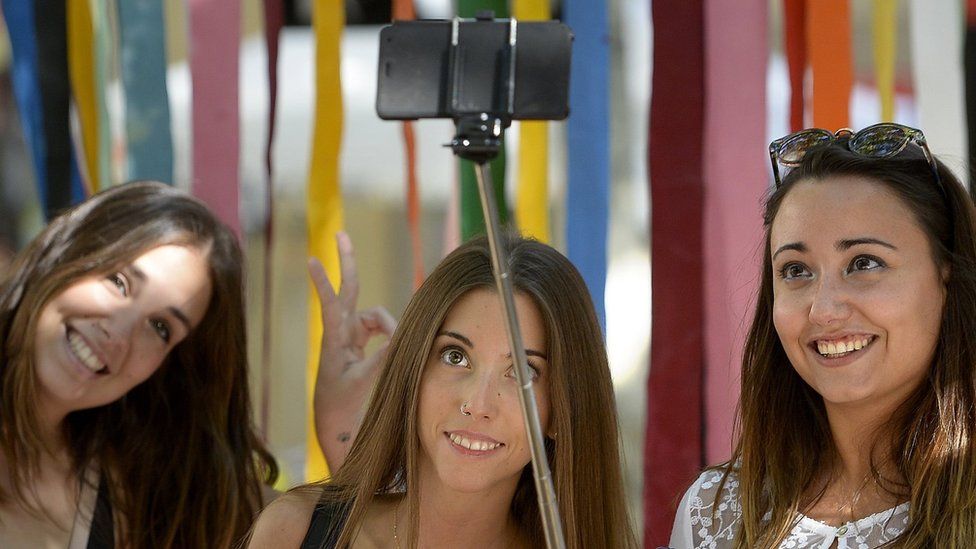Why millennials are the next tourism frontier
- Published

Clint Johnston can't speak on the phone when we first try because the service is patchy as he travels from Montenegro to Bosnia.
The next week it's hard to connect because he's sailing in Croatia.
It's a pretty typical schedule for the 33-year-old who founded website Triphackr, a travel company built for the millennial generation.
"Like their parents, millennials love to travel, but they are looking to experience travel in a different way," says Mr Johnston.
The site mixes "travel hacks" like how to get cash back for delayed flights, with Instagram "trip-spiration".
Tie-ups with companies and tourism agencies have elevated the business from side-project to full-time job. It now earns up to $15,000 (£11,353) a month.
Johnston is one of a slew of digital media influencers reshaping the millennial tourism market.
The age group - loosely defined as those born from the early 1980's to 2000 - spends around $200bn (£153bn) on travel each year, according to market research firm FutureCast.
And overall, they have more cash to splash than any previous generation, with around $6tn in disposable income, according to market research firm Asia Insight.
Often cast as fickle and self-absorbed, the generation has been criticised for burning their money on lifestyle perks like avocado toast rather than saving to buy a house, but that tendency to spend is good news for tourism.
And a growing number of travel firms are trying to get a slice of the market.
All around holiday firms are touching up their brands with millennial buzz words - connected, experiential, authentic - in the hope of snaring younger customers.
Accommodation providers are concentrating on shared spaces, faster internet and high-tech toys.
Serviced apartment operator Frasers Hospitality said iPad-activated check-ins, and laundrettes fitted with video game consoles, are helping lure travellers to its millennial-focused Capri by Fraser hotels.
Meanwhile, Aloft Hotels has attempted an emoji-based room service trial, and a robot butler service .
And soon millennials will get their own airline.
It's called Joon and is due to hit the skies later this year. The carrier will serve the needs of 18 to 35-year-olds, though exactly how it will do so isn't clear.
Owner Air France has revealed snazzy blue crew uniforms and said it won't be a budget airline. It describes Joon as a "lifestyle brand" and a "permanent innovation laboratory" for its customers.
Joon, it says, is a "state of mind."
Is that enough to hook the discerning millennial traveller? #Probably not.
Katrina Leung, executive director of travel trade group ITB Asia, believes Joon's pitch won't cut it with younger consumers.
For it to take off, Joon needs to deliver more of what they want.
"If it focuses on more perks and the ambiance as a whole, partners with key hip hotels or works with local guides, those things might help attract millennials," she says.
A survey by the Pacific Asia Travel Association found that 85% of Asian millennials wanted to "live like a local" while on holiday. Food was also priority when visiting a new destination.
They also travel more than older people. When millennials hit the road they want unique experiences, as well as cultural and authentic encounters.
Along the way millennials will share their experiences on social media and rely heavily on user reviews to make travel decisions. Brand loyalty is typically low.
Tapping into these desires and habits, says Ms Leung, is crucial to securing younger traveller.
Like their holidays, millennials want authenticity when it comes to brands.
Jeff Fromm, partner at Barkley ad agency, says companies make some common mistakes in their pitches to young consumers, including trying to act like millennials and not making good on promises.
"Millennials can spot a phony, so brands must offer proof on any claims." he says. "When brands try to be something they aren't, they get caught."
And that's where influencers and websites like Triphackr can play a role.
Mr Johnston said the community he can reach through social media offers "more value than any traditional marketing campaign".
"I have made friends all over the world through Instagram and the community is one of the best on any social network," he says.
"When someone asks me to help plan their next trip I am only a comment or email away. "
- Published18 July 2016
- Published18 October 2016
- Published14 April 2017